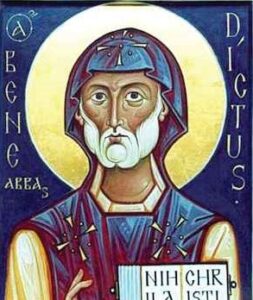 St. Benedict (born in 480) is known as the “Father of Western Monasticism.” He had a huge influence in his own time and in succeeding centuries. The men who joined with him in a communal life (monks) were a source of stability in the highly disordered state of Europe following the collapse of the Roman Empire and the invasions of the northern tribes in the early sixth-century. He laid the ground for the emergence of the cultural wealth of the Renaissance (from the 12th century onwards).
St. Benedict (born in 480) is known as the “Father of Western Monasticism.” He had a huge influence in his own time and in succeeding centuries. The men who joined with him in a communal life (monks) were a source of stability in the highly disordered state of Europe following the collapse of the Roman Empire and the invasions of the northern tribes in the early sixth-century. He laid the ground for the emergence of the cultural wealth of the Renaissance (from the 12th century onwards).
St. Benedict’s vision was a life characterized by prudence and moderation rather than severe asceticism. It was a communal life lived within a framework of authority, obedience, stability, and community. ‘Stability’ meant that a monk would generally stay permanently in the monastery which he had joined. It was also a way of life which was complete, well-ordered, and practical. The monk’s day was taken up with liturgical prayer, complemented by sacred reading and manual work of various kinds which took care of the community’s needs.
St. Benedict was not a priest and there is no direct evidence that he intended to found a “Religious Order.” His principal goal and achievement was to write a Rule or “way of life” and then help others live by it. His own personality is reflected in his description of the kind of person the abbot (or “father”) should be: wise, discreet, flexible, learned in the law of God, but also a spiritual father to his community.
Let us pray. “O God, who made the Abbot Saint Benedict an outstanding master in the school of divine service, grant, we pray, that, putting nothing before love of you, we may hasten with a loving heart in the way of your commands. Through our Lord Jesus Christ, your Son, who lives and reigns with you for ever and ever. Amen.”
For a wonderful look at Benedictine life, with a local connection: https://www.mountangelabbey.org/

